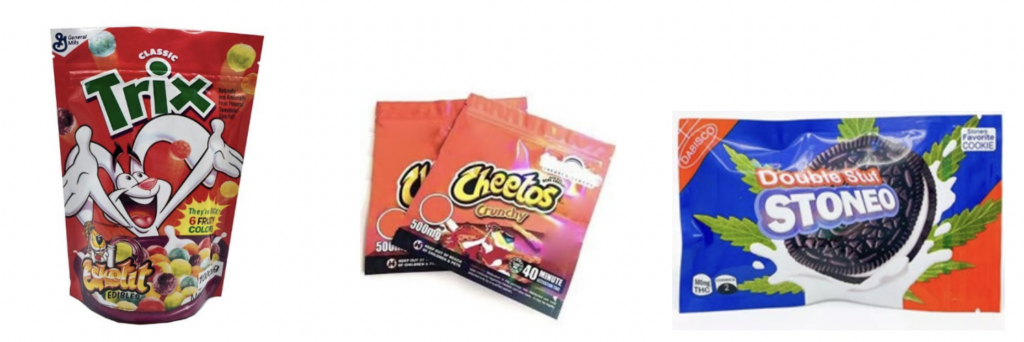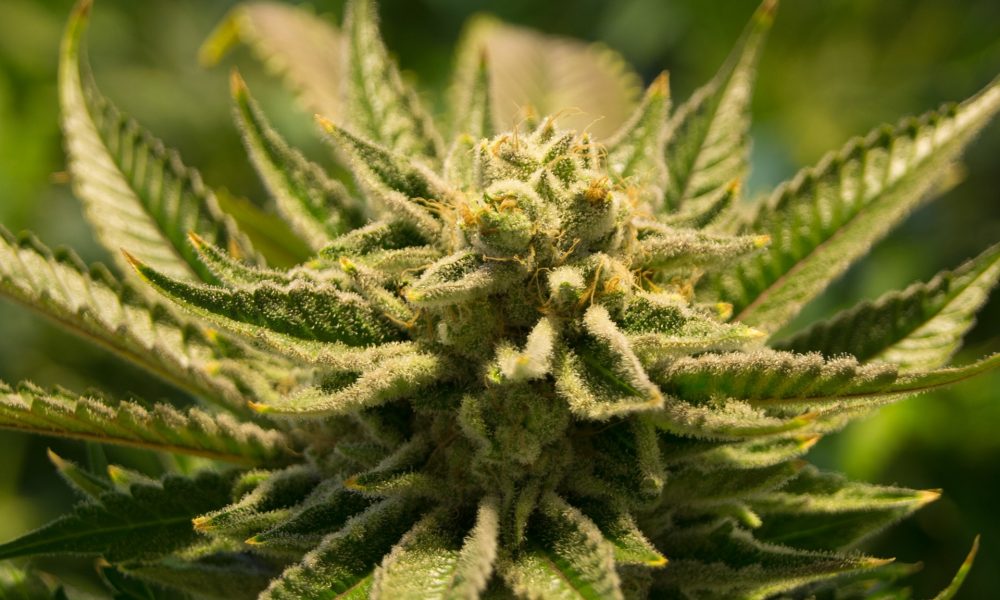Major food and beverage companies like Pepsi, General Mills and Kellogg are asking Congress to do more to prevent the proliferation of marijuana-infused copycat products that mimic their well-know brands.
In a letter led by the Consumer Brands Association that was sent to congressional lawmakers on Wednesday, more than a dozen companies and industry trade association associations said that misleading packaging of cannabis products that are modeled in the style of popular commercial items poses a public safety risk, particular for children.
“Children are increasingly threatened by the unscrupulous use of famous brand logos, characters, trademarks and trade dress on THC-laced edible products,” the letter says.

Via CBA.
“While cannabis (and incidental amounts of THC) may be legal in some states, the use of these famous marks, clearly without approval of the brand owners, on food products has created serious health and safety risks for consumers, particularly children, who cannot tell the difference between these brands’ true products and copycat THC products that leverage the brand’s fame for profit,” it continues.
A potential remedy that the associations and companies are suggesting would be to revise a section of an anti-counterfeit bill that’s been attached to broader, wide-ranging manufacturing legislation that is heading to bicameral conference.
The food industry operators say that expanding the bill to penalize companies that sell “famous” marks that don’t necessarily meet the definition of “counterfeit” could help resolve the problem.
Here’s the language change they want to the SHOP SAFE Act components of the America COMPETES Act:
“[A]n electronic commerce platform shall be deemed contributorily liable in a civil action by the registrant for the remedies hereinafter provided for a case in which, without the consent of the registrant, a third-party seller uses in commerce a famous or counterfeit mark in connection with the sale, offering for sale, distribution, or advertising of goods that implicate health and safety.”
The definition of a “famous mark” already exists under federal statute, referring to brands that are “widely recognized by the general consuming public of the United States as a designation of source of the goods or services of the mark’s owner.”
Signatories of the letter to Congress on this issue include Kellogg Company, PepsiCo, General Mills, American Bakers Association, Digital Citizens Alliance, Mondelēz International, American Herbal Products Association, Association for Dressings & Sauces and more.
“This change is critical because it closes a loophole in the existing language to address a critical health and safety issue,” the companies and associations said. “We urge your support.”
Preventing underage marijuana use is a common goal among advocates and prohibitionists alike. While federally funded studies have found that adolescent cannabis use has remained stable or even declined in states that have legalized and regulated marijuana, there’s consensus that precautions should be taken to ensure that young people don’t mistakenly consume cannabis.
Around Halloween last year, attorneys general from multiple states across the U.S. warned parents about illicit marijuana products that resemble popular candies and snacks like Cheetos, Nerds and Oreos, which could confuse kids and lead to accidental intoxication.
Activists have grown weary of sensationalized and often unsubstantiated reports of people giving away free marijuana edibles to children on the holiday, but it speaks to a larger trend that the trade associations and corporations are raising in the new letter.
Meanwhile, advocates and stakeholders are also paying attention to the America COMPETES conference for a different cannabis-related reason.
Supporters are holding out hope that the large-scale legislation will include language to protect banks that work with state-legal marijuana businesses. It was included in the House version, only to be stripped by the Senate. Now it seems that it will depend on appointed conferees to get the Secure and Fair Enforcement (SAFE) Act in the final package.
Two key lawmakers sent a letter on Wednesday urging leadership and conferees to include the reform in that final deal.
Sen. Patty Murray (D-WA), a conferee and the third-highest-ranking Senate Democrat, recently visited a credit union for an event where she reiterated her support for passing the bipartisan cannabis banking reform bill and explained how she’ll fight to get the policy change enacted sooner rather than later.
House Financial Services Committee Chairwoman Maxine Waters (D-CA), another conferee, also listed the SAFE Banking Act as a legislative priority as negotiations are set to begin.
Read the letter on marijuana marketing concerns from major brands below:
Colorado Senators Approve House-Passed MDMA Legalization Bill In Committee
Medical Disclaimer:
The information provided in these blog posts is intended for general informational and educational purposes only. It is not a substitute for professional medical advice, diagnosis, or treatment. Always seek the advice of your physician or other qualified healthcare provider with any questions you may have regarding a medical condition. The use of any information provided in these blog posts is solely at your own risk. The authors and the website do not recommend or endorse any specific products, treatments, or procedures mentioned. Reliance on any information in these blog posts is solely at your own discretion.






